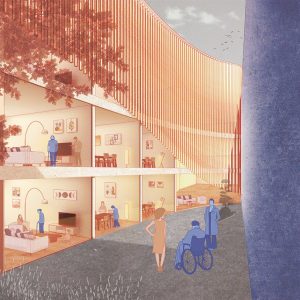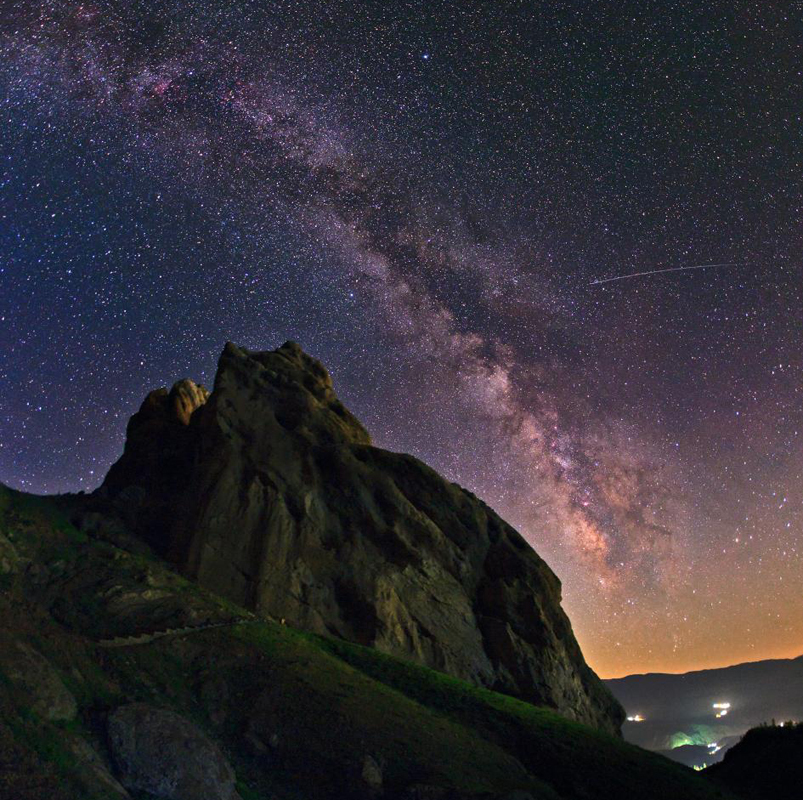Link About It: This Week’s Picks
A custom Porsche 911 Safari, edible invasive species, a hotel in space and more from around the web

2021’s Dazzling Stargazing Events
 Following 2020’s uncommon and inspiring roster of celestial happenings, 2021’s heavenly events will keep us gazing skyward. From February’s Venus-Jupiter conjunction to May’s “Blood moon” total lunar eclipse and the peak of the Perseid meteor showers in August, spectacular astronomical delights will unfurl. While some will cross entire continents, others will manifest in specific destinations. See all of this cosmic calendar—and where everything will be visible—at National Geographic.
Following 2020’s uncommon and inspiring roster of celestial happenings, 2021’s heavenly events will keep us gazing skyward. From February’s Venus-Jupiter conjunction to May’s “Blood moon” total lunar eclipse and the peak of the Perseid meteor showers in August, spectacular astronomical delights will unfurl. While some will cross entire continents, others will manifest in specific destinations. See all of this cosmic calendar—and where everything will be visible—at National Geographic.
Image courtesy of NASA
Cambridge University Announces “The Cambridge Companion to Video Game Music”
 Cambridge University will publish The Cambridge Companion to Video Game Music, a “comprehensive, up-to-date survey of video game music,” online this March, and a print edition will follow shortly after. Academics and gamers will contribute to the effort, which aims to assess the sonic contributions games have made in popular culture. Edited by Tim Summers and Melanie Fritsch, the book strives to be a formal study rather than anecdotal essays on a track’s inception or a game’s composition. That information will also be available, but promises to be balanced with explorations of psychology and business strategy. Read more at Crack Magazine.
Cambridge University will publish The Cambridge Companion to Video Game Music, a “comprehensive, up-to-date survey of video game music,” online this March, and a print edition will follow shortly after. Academics and gamers will contribute to the effort, which aims to assess the sonic contributions games have made in popular culture. Edited by Tim Summers and Melanie Fritsch, the book strives to be a formal study rather than anecdotal essays on a track’s inception or a game’s composition. That information will also be available, but promises to be balanced with explorations of psychology and business strategy. Read more at Crack Magazine.
Image courtesy of Cambridge University Press
Singer’s Custom Porsche 911 Safari, The ACS
 California-based Singer Vehicle Design’s all-new restoration, The ACS (aka All-Terrain Competition Study), reimagines a 911 Safari Porsche building atop the 1990 964 with retro-future lines and proportions. A carbon fiber body and aluminum protective panels house a twin-turbo, air-cooled, 3.6-liter flat-six equipped with just under 450 horsepower. Also included are a long-range fuel tank and two full-size sets of spare tires and wheels, at the request of the anonymous client who commissioned the project. Said client purchased two models—one red and one white—and plans to test their limits on dirt and asphalt courses. Singer states that the owner plans to offer the same blueprint for other buyers seeking their own edition, but it’ll come with a price tag of well over $1 million. Read and see more at The Drive.
California-based Singer Vehicle Design’s all-new restoration, The ACS (aka All-Terrain Competition Study), reimagines a 911 Safari Porsche building atop the 1990 964 with retro-future lines and proportions. A carbon fiber body and aluminum protective panels house a twin-turbo, air-cooled, 3.6-liter flat-six equipped with just under 450 horsepower. Also included are a long-range fuel tank and two full-size sets of spare tires and wheels, at the request of the anonymous client who commissioned the project. Said client purchased two models—one red and one white—and plans to test their limits on dirt and asphalt courses. Singer states that the owner plans to offer the same blueprint for other buyers seeking their own edition, but it’ll come with a price tag of well over $1 million. Read and see more at The Drive.
Image courtesy of Singer Vehicle Design
Architects Reimagine a Hospital to be More Like Home
 Architects Yuexin Yu and Dessery Dai received an honorable mention from arch out loud (an architecture research initiative) for their concept reimagining and redesigning a hospital to more closely resemble spaces within the home. Essentially including living spaces within a fully-fledged health facility, the design removes the distance between patients and their family. Friends or family can live on-site, while the space makes room for healthcare staff to easily move through and treat the patient. Rather than a clunky attempt at adding living space to a stark hospital room, the thoughtful, practical concept keeps the two entities separate yet appealing and welcoming—complete with green areas and “warm materiality.” An altogether logical idea, this concept could change the experiences and lives of many. See more at designboom.
Architects Yuexin Yu and Dessery Dai received an honorable mention from arch out loud (an architecture research initiative) for their concept reimagining and redesigning a hospital to more closely resemble spaces within the home. Essentially including living spaces within a fully-fledged health facility, the design removes the distance between patients and their family. Friends or family can live on-site, while the space makes room for healthcare staff to easily move through and treat the patient. Rather than a clunky attempt at adding living space to a stark hospital room, the thoughtful, practical concept keeps the two entities separate yet appealing and welcoming—complete with green areas and “warm materiality.” An altogether logical idea, this concept could change the experiences and lives of many. See more at designboom.
Image courtesy of Yuexin Yu and Dessery Dai
Axiom’s Space Hotel Planned for 250 Miles Above Earth
 Philippe Starck has designed the guest rooms within a new hotel from Axiom—but this property is set to be located in space, 200+ miles above Earth’s surface. Axiom Space (co-founded by Michael Suffredini, the former manager of the International Space Station) plans to launch the first-ever commercial space, in space, in 2024 for around $2 billion. Former NASA chiefs and astronauts are helming the endeavor, which will feature rooms equipped with panoramic views of Earth, “nest-like comfort” amenities and more. “Axiom was founded with the vision of a thriving home in space that benefits every human every where,” Suffredini says. “We often hear that this is a very bold statement. It is.” Read more at The Times.
Philippe Starck has designed the guest rooms within a new hotel from Axiom—but this property is set to be located in space, 200+ miles above Earth’s surface. Axiom Space (co-founded by Michael Suffredini, the former manager of the International Space Station) plans to launch the first-ever commercial space, in space, in 2024 for around $2 billion. Former NASA chiefs and astronauts are helming the endeavor, which will feature rooms equipped with panoramic views of Earth, “nest-like comfort” amenities and more. “Axiom was founded with the vision of a thriving home in space that benefits every human every where,” Suffredini says. “We often hear that this is a very bold statement. It is.” Read more at The Times.
Dishing Up Invasive Species as Locavore Delicacies
 Scientists are increasingly looking to chefs to help save threatened wetlands, lakes, rivers and forests from invasive species by encouraging them to turn pesky vines like kudzu, ravenous lionfish, feral hogs and other unwelcome species into delicacies with a locavore flavor. National Geographic features several of the chefs, organizations and restaurants in the south tackling the problem of managing invasive species and the delights that can be created with them, all while keeping their local biodiversity in balance. Find out more at National Geographic.
Scientists are increasingly looking to chefs to help save threatened wetlands, lakes, rivers and forests from invasive species by encouraging them to turn pesky vines like kudzu, ravenous lionfish, feral hogs and other unwelcome species into delicacies with a locavore flavor. National Geographic features several of the chefs, organizations and restaurants in the south tackling the problem of managing invasive species and the delights that can be created with them, all while keeping their local biodiversity in balance. Find out more at National Geographic.
Image courtesy of Alexander Vasenin
Kyoto University Develops the First-Ever Wooden Satellite
 In an effort to reduce space waste and the numerous safety concerns associated with the vast amount of debris in the cosmos, Kyoto University is developing a satellite with a shell made of timber, designed to burn up completely upon reentry into the atmosphere after its life cycle. Former astronaut Takao Doi leads the team at Kyoto University, who work in conjunction with the Japanese logging company Sumitomo Forestry. Their LignoSat satellite will hopefully launch in 2023. Read more about their efforts—and rising amount of defunct objects overhead—at Dezeen.
In an effort to reduce space waste and the numerous safety concerns associated with the vast amount of debris in the cosmos, Kyoto University is developing a satellite with a shell made of timber, designed to burn up completely upon reentry into the atmosphere after its life cycle. Former astronaut Takao Doi leads the team at Kyoto University, who work in conjunction with the Japanese logging company Sumitomo Forestry. Their LignoSat satellite will hopefully launch in 2023. Read more about their efforts—and rising amount of defunct objects overhead—at Dezeen.
Image courtesy of Kyoto University
Link About It is our filtered look at the web, shared daily in Link and on social media, and rounded up every Saturday morning. Hero image courtesy of Singer Vehicle Designs












